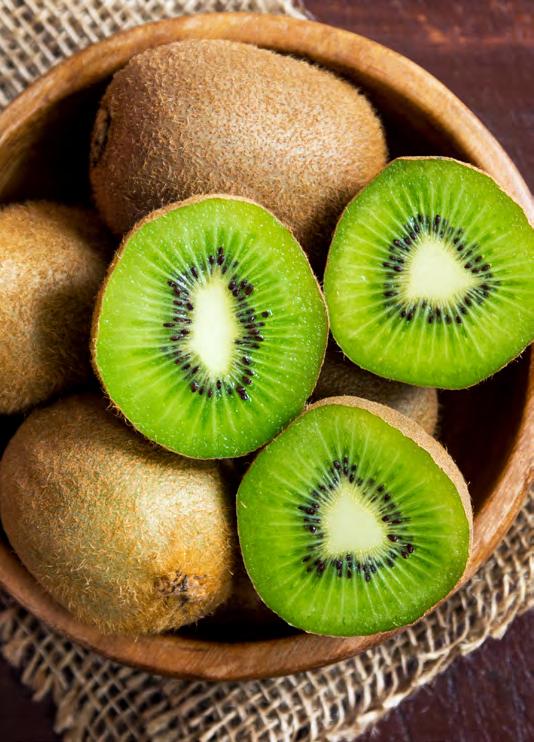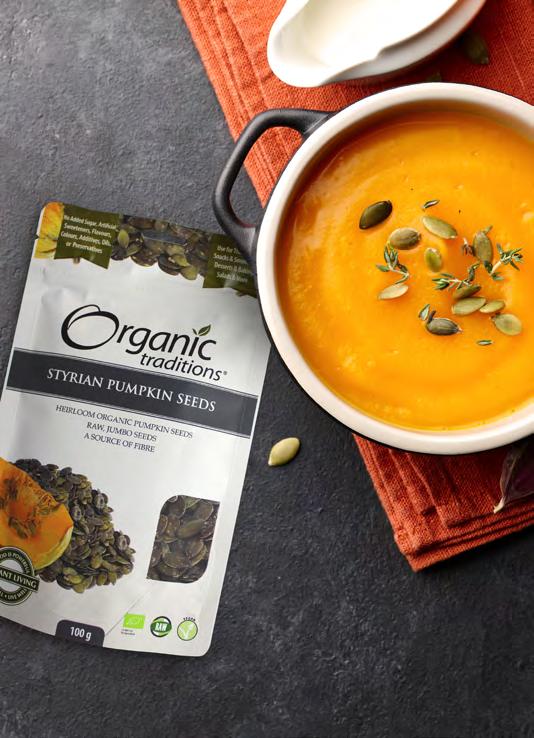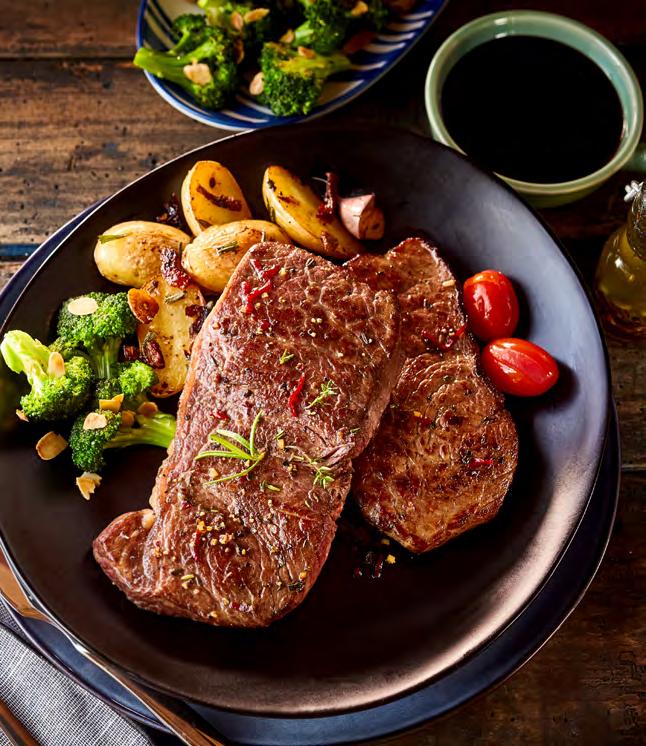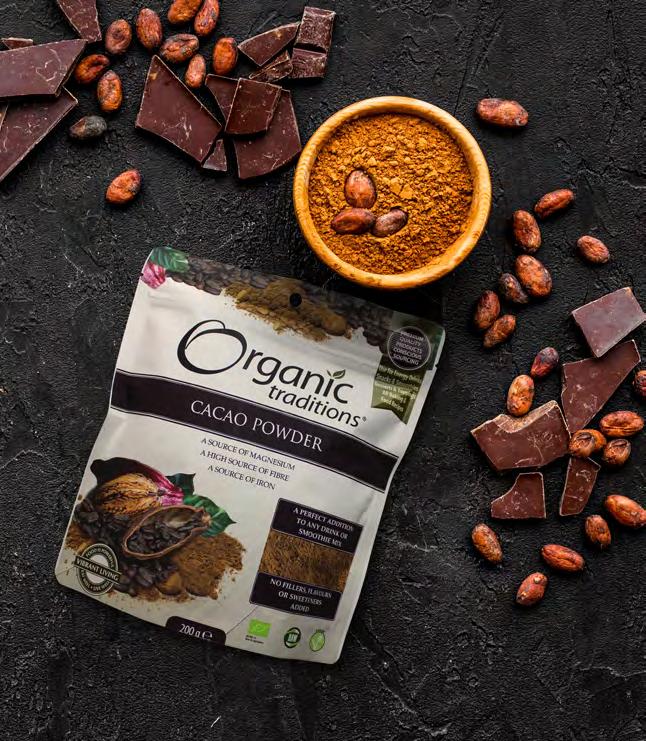
5 minute read
35 FEED YOUR SKIN
FEED YOUR SKIN FROM WITHIN The Best Foods to Eat for Healthier Skin
With so many food fads and trends in today’s market, it can be difficult sometimes to separate the wheat from the chaff when it comes to food trends and superfoods (note: wheat is most definitely NOT a superfood!). To stand a chance of recognising what’s a superfood and what’s just another clever marketing ploy, we must first understand what a superfood is. A superfood is a food which is richer and denser in phytonutrients than your average food and has positive health benefits with few/no negatives. The problem with the term superfood is that it is rather vague; there is no standard set, no minimum bar that the food has to pass to become super. But, without a doubt, some foods are more nutritious, just like some are more delicious, than others! It’s important that we eat a well balanced diet to maintain our wellbeing, healthy weight and to let our bodies perform at their very best. There are also some pretty super foods that some eat every day, probably without realising just how nutrient-rich they are!
Advertisement
Here are some of our favourite foods to eat for super skin - we think you’ll be surprised at the lack of supposed “superfoods” in there - that start by addressing your health from within and let your skin show the glowing results!
KIWI FRUIT There is over 100% of your RDA of vitamin C in one medium sized kiwi. Vitamin C is essential for collagen synthesis, one of the building blocks of your skin. A study in the American Journal of Clinical Nutrition[1] found that a diet high in vitamin C was associated with less dryness and less noticeable wrinkles.
OLIVE OIL A 2012 study in PLOS ONE[2] analysed the diets of 1264 women, and found that those with a higher consumption of olive oil (over 2 teaspoons a day) had 31% fewer signs of ageing compared to those who consumed around 1 teaspoon. Why? The polyphenols in olive oil may help scavenge free radicals, and the monounsaturated fatty acids may also play their own part. Try: Organic Traditions Ice Pressed Olive Oil

TOMATOES Rich in vitamin C and lycopene, powerful antioxidants that help fight free radicals. Cooked tomatoes contain more lycopene than raw, and a 2008 UK study[3] found that those who consumed 5 tablespoons of tomato paste along with a tablespoon of olive oil for a period of 12 weeks had 33% more protection from sunburn compared to the control group who only consumed the olive oil.
OILY FISH Salmon is high in omega-3 fatty acids, which help prevent and reduce inflammation, a key cause of ageing. A serving of sardines contains 1.5 grams of omega-3 fatty acids, making it one of the best sources of the fat. Fatty fish is particularly rich in the type of omega-3 called DHA, an anti-inflammatory. Mackerel is one of the best sources of vitamin B12, containing 16 mcg, or 270% of your RDA per serving. One symptom of B12 deficiency is hyperpigmentation and vitiligo. Try: Nature’s Answer Omega-3 Deep Sea Fish & Black Seed Oil

PUMPKIN Pumpkin seeds are rich in omega-3 and -6 essential fatty acids and zinc, all of which are essential for good skin, and they are also rich in L-tryptophan which has antidepressant properties. Cooked pumpkin is one of the top sources of beta-carotene, which the body converts into vitamin A, essential for the growth of skin cells. Try: Organic Traditions Pumpkin Kernels


SUNFLOWER SEEDS There’s around 40% of your RDA of vitamin E in 30g of sunflower seeds. A study published in Experimental Dermatology[4] looked at 100 patients recently diagnosed with acne and found that those suffering from severe acne had 30% lower blood levels of vitamin E compared to the control group. Vitamin E is thought to enhance immune function, allowing the body to fight off the inflammation that leads to acne.
GREENS Spinach is an excellent source of iron - promotes healthy cell turnover and is involved in skin healing, vitamins K (skin strength), A, C, E (three antioxidants with many roles in the skin), B9 (folic acid - deficiency in which may lead to cracked skin) beta carotene (converted to vitamin A in the body) and minerals. Spinach has anti-inflammatory properties. Just one cup of kale gives you 134% and 133% of your RDA for skin-firming vitamin C and A, respectively. Kale is also one of the best sources of lutein and zeaxanthin, nutrients that absorb and neutralise free radicals created by UV light. Try: Organic Traditions Supergreens with Wheatgrass & Probiotics
GRASS FED BEEF Grass fed beef contains a higher ratio of omega-3 to omega-6 as well as nearly 30g protein per 100g. Our skin is made up of proteins so it makes sense that consuming protein will have a positive effect on our skin’s health. Wait! There’s even better news - our vices can have a positive effect on our skin health!
CHOCOLATE We’re not talking your Cadbury’s here, but the real good quality dark chocolate, raw cacao and cocoa solids. A 2006 study by Heinrich et. al[8] showed that women who drank cocoa rich in flavonoids had thicker, denser and better hydrated skin at the end of the study. More than this, their skin was also more resilient to UV exposure. Try: Organic Traditions Raw Cacao Powder

GREEN AND WHITE TEA Both green and white tea contain phytonutrients catechins, that boost blood flow and oxygen to the skin and help protect the skin and prevent sunburns; and polyphenols, which may help prevent and even reverse age spots and pigmentation on the skin. In a study published in the Journal of Nutrition in 2011[5], people who drank a beverage containing green tea polyphenols daily for 12 weeks had skin that was more elastic and smooth, and had onequarter less sun damage when exposed to UV light compared to a control group. Try: Organic Traditions Matcha Tea
COFFEE Your daily cup of Joe has been shown to help prevent non-melanoma skin cancer. A study published in the European Journal of Cancer Prevention in 2007 showed that women who drank coffee every day had an 11% lower prevalence of non-melanoma skin cancer, compared to people who didn’t drink coffee[6].
RED WINE Red wine is rich in resveratrol, an antioxidant compound which possesses anti-tumour properties. Australian researchers studied over 1000 adults and discovered the rate of actinic keratoses (skin lesions caused by long-term sun damage) was reduced by 28% in those that consumed half a glass of red wine a day[7]. Try: Nature’s Answer Resveratrol Reserve Complex
References [1] https://academic.oup.com/ajcn/article/86/4/1225/4649573 [2] http://journals.plos.org/plosone/article?id=10.1371/journal.pone.0044490 [3] https://medicalxpress.com/news/2008-04-tomatoes-sun.html [4] http://www.ncbi.nlm.nih.gov/pubmed/16681594 [5] http://jn.nutrition.org/content/early/2011/04/27/jn.110.136465 [6] http://www.ncbi.nlm.nih.gov/pubmed/17923816 [7] http://ajcn.nutrition.org/content/89/4/1246.full [8] http://www.ncbi.nlm.nih.gov/pubmed/16702322










